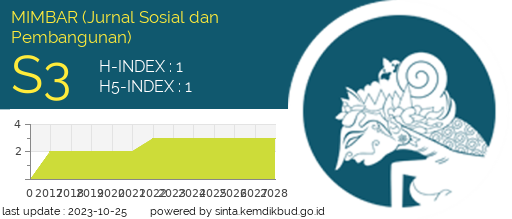Enhancement of UMKM Financial Management in Kec. Cilawu For Supporting The Halal Ecosystem
DOI:
https://doi.org/10.29313/mimbar.v39i2.2986Keywords:
Financial Management, Islam, Halal EcosystemAbstract
Most of the small traders in Cilawu are trapped by loan sharks. This condition is due to limited literacy and legal sources of capital. Still need to gain confidence in sharia financial service products. This study concludes the Enhancement of the Ability of UMKM Financial Management in Cilawu For Supporting The Halal Ecosystem is to increase literacy in financial management for traders, from planning to preparing financial reports that because the level of financial literacy of traders is still low, and traders do not have confidence in financial service institutions and financial service products; besides that, it is necessary to provide literacy in Islamic financial institutions and their financial products and services, which can directly boost the activities of Islamic financial institutions to contribute to the development of the halal ecosystem.
References
A. Amelia, “Pengaruh Literasi Keuangan, Sikap Keuangan, dan Kepribadian terhadap Perilaku Pengelolaan Keuangan pada Pelaku UMKM Kelurahan Gedong, Jakarta Timur,” J. Maksipreneur Manajemen, Koperasi, dan Entrep., vol. 12, no. 1, p. 129, 2022, doi: 10.30588/jmp.v12i1.890.
Amanah Rabbaniah, “Peristiwa Muakhot (Pondasi Ekonomi yang sering terlupakan),” bprsar.com, 2016. https://bprsar.co.id/peristiwa-muakhot-pondasi-ekonomi-yang-sering-terlupakan/.
Anandini, F. (2020). Identification of Prospects for Sustainability of Community Based Clean Water Supply Activities after the Water and Sanitation for Low-Income Community-2 Program Ends (Case study: Bogor Regency). Journal of Regional and City Planning, Vol 23/2 December 2011.
D. Prihatini et al., “Jurnal Pengabdian Masyarakat Akademisi Peningkatan Literasi Keuangan Islam Pada KSPPS di Kabupaten Jurnal Pengabdian Masyarakat Akademisi,” vol. 1, no. 4, pp. 72–80, 2022.
M. Iqbal, “Bupati Garut : Ekonomi Meningkat tapi Kemiskinan di Garut Meningkat.,” Merdeka.com, 2021. https://www.merdeka.com/peristiwa/bupati-sebut-angka-kemiskinan-di-garut-meningkat.html.
M. N. Putri, “Literasi Keuangan Syariah Dan Kinerja Umkm,” Milkiyah J. Huk. Ekon. Syariah, vol. 1, no. 2, pp. 81–87, 2022, doi: 10.46870/milkiyah.v1i2.240.
M. K. Ahyar and A. Abdullah, “Membangun Bisnis dengan Ekosistem Halal,” J. Pasar Modal dan Bisnis, vol. 2, no. 2, pp. 167–182, 2020, doi: 10.37194/jpmb.v2i2.46.
M. A. Reni Fatwitawati S.E., “Pengelolaan Keuangan Bagi Usaha Mikro Kecil Menengah (UMKM) Di Kelurahan Airputih Kecamatan Tampan Kota Pekanaru,” Sembadha Semin. Has. Pengabdi. Kpd. Masy., vol. 01, no. 01, pp. 225–229, 2018, [Online]. Available: https://jurnal.pknstan.ac.id/ index.php/sembadha/article/view/376.
M. A. Rachman, “Halal Industry in Indonesia: Role of Sharia Financial Institutions in Driving Industrial and Halal Ecosystem,” Al-Iqtishad J. Ilmu Ekon. Syariah, vol. 11, no. 1, pp. 35–58, 2019, doi: 10.15408/aiq.v11i1.10221.
M. C. Sucipto, “Advokasi dan Edukasi Masyarakat tentang Bahaya Rentenir Di Desa Sukatani Purwakarta,” ADINDAMAS J. Pengabdi. Kpd. Masy., vol. 2, no. 1, pp. 50–63, 2022, doi: 10.37726/adindamas.v2i1.431.
N. Nisha and M. Iqbal, “Halal ecosystem: Prospect for growth in Bangladesh,” Int. J. Bus. Soc., vol. 18, no. S1, pp. 205–222, 2017.
N. Asmita, “Peran Koperasi Simpan Pinjam dan Pembiayaan Syari’ah (KSPPS) dalam Pemberdayaan Ekonomi Masyarakat,” J. An-Nahl, vol. 7, no. 2, pp. 171–176, 2020, [Online]. Available: https://core.ac.uk/download/pdf/295427513.pdf.
Nikmatuniayah Nikmatuniayah, Marliyati Marliyati, “Akuntabilitas Laporan Keuangan Lembaga Amil Zakat di Kota Semarang,” J. Mimbar, vol. 31, no. 2, pp. 487, 2015, doi: 10.29313/mimbar.v31i2.
Neneng Konety, Savitri Aditianty, Nurfarah Nidatya, “Japan’s Rational Choice in Developing the Halal Industry,” J. Mimbat, vol. 37, no. 1, pp. 187, 2019, doi: 10.29313/mimbar.v37i1.
P. M. Antara, R. Musa, and F. Hassan, “Bridging Islamic Financial Literacy and Halal Literacy: The Way Forward in Halal Ecosystem,” Procedia Econ. Financ., vol. 37, no. 16, pp. 196–202, 2016, doi: 10.1016/s2212-5671(16)30113-7.
Purnomo M Antara, Rosidah Musa, Faridah Hassan, “Bridging Islamic Finansial Literacy and Halal Literacy: The Way Forward in Halal Ecosystem,” Procedia Economics and Finance, vol. 37, no.pp 197, 2016. doi: 10.1016/S2212-5671(16)30113-7
R. Krisna, “Analysis of the Halal Ecosystem and Halal Literacy on the Development of Islamic Economic Halal Regulation,” 1st Proceeding Int. Conf. Bus. Econ., vol. 1, no. 1, pp. 318–336, 2023.
R. Rasyid, “Analisis Tingkat Literasi Keuangan Mahasiswa Program Studi Manajemen Fakultas Ekonomi Universitas Negeri Padang,” J. Kaji. Manaj. Bisnis, vol. 1, no. September, pp. 91–106, 2012.
R. Setiawati, S. R. Nidar, M. Anwar, and D. Masyita, “Islamic financial literacy: Construct process and validity,” Acad. Strateg. Manag. J., vol. 17, no. 4, 2018.
S. . Xiao, J. J., Ahn, S. Y., Serido, J., & Shim, “Earlier Financial Literacy and Later Financial Behaviour of College Students,” Int. J. Consum. Stud., vol. 38, no. 6, pp. 592–601, 2014.
S. Surepno and S. H. Sa’diyah, “Tingkat Literasi Keuangan Syariah Pelaku Umkm Dan Pengaruhnya Terhadap Perkembangan Umkm Di Kecamatan Jepara,” AKSY J. Ilmu Akunt. dan Bisnis Syariah, vol. 4, no. 1, pp. 145–162, 2022, doi: 10.15575/aksy.v4i1.17108.
Tasya Aspiranti, Ima Amaliah, “MSME’s Acceleration Strategy Based on Sharia Bank Financial Performance in Indonesia,” J. Mimbar., vol. 35, no 2, pp. 277, 2019, doi: 10.29313/mimbar.v35i2
Widya, “Pelatihan Dan Pendampingan Literasi Keuangan : Upaya Menumbuhkan Perilaku Pengelolaan Keuangan Pada Toko Barokhah , Giwangan,” Madani J. Pengabdi. Kpd. Masy., vol. 7, no. 2, pp. 73–80, 2021
Downloads
Published
Issue
Section
License
Copyright (c) 2023 MIMBAR : Jurnal Sosial dan Pembangunan

This work is licensed under a Creative Commons Attribution-NonCommercial-ShareAlike 4.0 International License.














